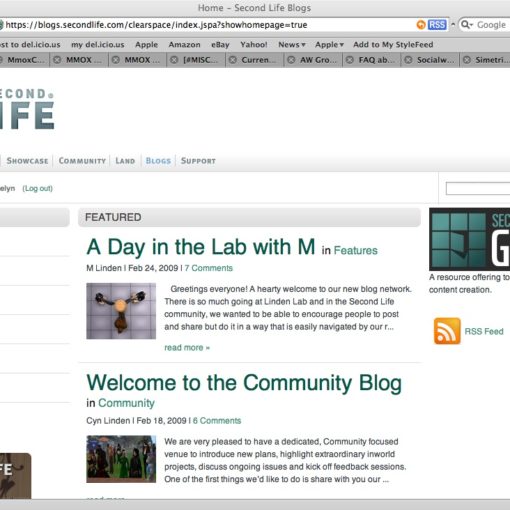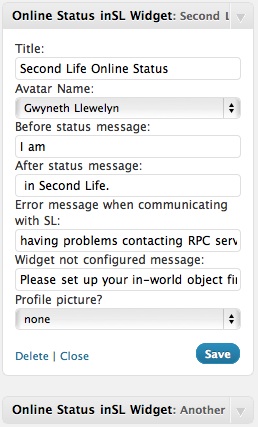Not so long ago, I commented on the future of music distribution via virtual worlds like Second Life®. It is still my belief that we’re assisting at the end of an age where music distribution via records/tapes/CDs and earning an income from royalties is coming to an end. While “free information activists” have long since predicted the downfall of the RIAA and the end of “music piracy” as a crime, they usually just address one side of the issue: consumers, who currently have sidestepped the distribution model by essentially exchanging music for free. Initiatives like Apple’s iTunes tend to combine both models: easy music distribution for a very low price and making sure that the musician gets a cut from the profit.
But these models completely forget one major player in the music industry: the musicians and performers themselves.
How, indeed, shall they survive, if their music is freely copied?
History
Let’s step back a few centuries, back into the Renaissance and the 17th century. Back then, music as a cultural product thrived, next to all the other arts. And, like painting, sculptures, or architecture, it used the same model: patrons, who sponsored the musician, and had him perform for the patron, their family, and their friends. Needless to say that music was not a mainstream consumer product: only the very rich could afford to sponsor their own artist, but at least, while having a patron, the musician wouldn’t need to worry about getting an income. They would simply rely upon the patron to pay for their bills and expenses, and to provide them a room with a clean bed and some food — and then focus entirely on their art.
There was also “mainstream music” to a degree: Church concerts, at least in Europe. Here the “sponsor” was the Church itself — they had a budget, raised through donations and other forms of monetary contributions, which allowed the church to hire a permanent musician, who would perform for free every Sunday. All the big masters tried at some time to get a job as maestros at some church — a good paying job, and much more regular income than having a patron, although it also meant composing much more liturgical pieces. A further alternative was provided by universities and other music schools, also regular paying jobs.
It’s only much more recently — starting at the end of the 18th century, but mostly during the 19th century — when the model changed. When it started to be clear that there was a mainstream audience for non-liturgical music, musicians became hired artists for shows: the business model of the Opera was born. With forms both for the common people and the nobility, operas were usually ran as businesses (although many enjoyed sponsorship by princes and kings; however, later in the 18th century, many operas were ran by merchants and businessmen): the audience would pay an entrance fee to see the show, and the musicians, director, and composer would all get a cut from the proceedings. Great opera composers and scriptwriters were hired (and paid in advance) to create masterpieces that had instant commercial success; but sometimes they experimented with new composers (ironically, as my friend Lillie Yifu points out, the most known opera pieces nowadays, from composers we recognise as “grand masters”, were largely ignored in their time — the mainstream, as today, basically watched junk). Business prospered as music became entertainment (still to be had for free inside churches; but available for a small fee on opera houses).
An interesting side-effect that became commonplace in the Victorian Era, as more and more people started to learn how to play the piano, was that operas got “teasers” — bits and pieces of the most popular arias would get arranged (Mendelssohn became famous for his many arrangements) for the piano and played at home by amateurs. Now this started to spread “music” in a different way: instead of going to a special place — an opera house, a concert hall, a church — you could bring the music into your own home, for a small fee (paying for the music sheet).
Music is a strange art form: it is performed — ephemeral — but it can be written down — permanent. Nearing the end of the 19th century, a new way of distributing music appeared: records. And a further way of distribution appeared with radio a few decades later.
We thought this would be the end really, but up until now, there was something that tied the musician to the payment for their work. Be it by having a sponsor for private audiences; or a permanent job at the church or a university; or getting royalties from sheet music, records, or radio broadcasts — in all these cases, there was a clear way for the musician to earn some money for their work.
The Analogue Hole
This all started to change when music left the analogue stage and became digital — suddenly, a new, far more powerful means of distribution questioned the whole model: the Internet, and the so-easy-to-copy CD. Music was never so widely distributed as today, and more important than that, it’s so easy to copy music, like it never was before. You don’t need to be a masterful performer; you don’t need to leave your home; you don’t even need to go to a shop to pick it up. You can get it for free easily, anywhere on the Internet, or sometimes for a small fee (like through iTunes).
Clearly, the RIAA is fighting its last battles. You cannot prevent the flood of music being distributed. There is a finite amount of time that lawyers have to stop every one of the 2 billion Internet users to copy music for free. There is always a way.
The question is not really about the RIAA or any of the other organisations… at some point in time, they will have no choice but to give up. It can take a decade or so, but in the end, there will be no point to continue to fight battle after battle, when the war is practically lost.
No, the question is: how will the musicians be paid, if nobody will pay for their music any longer?
Sure, several musicians earn more these days from live performances than from royalties. Not everybody, however, will be so lucky — the labels did handle marketing, promotion, and raising world-wide awareness for musicians. They could afford all that because they earned an income from selling CDs 🙂 If that resource stream is cut, however, it will mean less promotion, less marketing, and people being less aware of the musicians.
So, while on one hand word-of-mouth and peer-to-peer transfer of music, as a viral tool, actually promotes the musician, the truth is that musicians will have a much harder fight to be known. In a sense, it’s like a journalist dropping her job to become a blogger. Only a tiny majority of bloggers earn an income from their writing — but there are millions and millions of them. The same might just happen to musicians as well.
RL music sponsors?
Ironically, some people have suggested that musicians fall back to the model used in the Renaissance: try to get a patron. These days it might also mean getting a corporate sponsor. These are valid alternatives, but it requires a big change of mentality — mostly from musicians, since the very same model is used by, say, athletes. Agents will probably handle the sponsoring, and the big record labels might just turn into marketing agencies — after all, they know the business, and they know the sponsors. So, under this model, the musician will fight to get a good agent that will bring them a nice sponsor, and be able to compose without worrying about their bills and expenses… while their music will be spread world-wide, for free, through the Internet.
Now, before I ever logged in to SL, I thought that there were few alternatives for the musicians. However, we have seen how strong the music scene is in Second Life. It grew absurdely. Just take a look at the Events list: over a hundred live performances every day. It’s astonishing! And that is not counting with the DJs, of course.
These musicians performing in SL are actually making a living. Some of them are charging 500 Euros for a show! Now, don’t get me wrong, I find this absolutely delightful — because it means that these high quality musicians are actually earning quite close to what they would earn if they’d be performing in bars and small concert rooms. But they’re saving the costs of equipment, travel, and hotel… SL is so much more convenient, all you need it to hook up your equipment to a computer, rent a streamer, and you’re set up.
In effect, this “near future” of agents promoting and advertising musicians and getting sponsors for them is happening right now in SL. You could view it as a “rehearsal” of what the future might bring.
Then again, it might be something else. I jokingly refer to SL as a Virtual Rennaisance because so many new things are happening in arts and architecture, inside SL, that would be impossible elsewhere. And perhaps this is something new which actually makes sense: if music became digital and is easily got everywhere, why shouldn’t performances become digital too, and as easy to find as the music itself?
I believe that actually it was the RIAA’s paranoid stance against “streaming” that unexpectedly launched the whole “live performances in SL” trend. DJs, since they use music copied from their computers into a stream, are technically in violation of the current legislation (unless, by chance, they are paying their royalties). But live performers aren’t! They’re just playing their music, and nobody can prevent them to perform their own music in any way they wish.
Whatever the reason, RL companies are taking an interest. Public radio is continuing to set themselves up in SL. We saw Sony BMG and AOL selling music (and video) in SL last year. They were not the only ones. And I’m still eagerly waiting Apple to open iTunes inside SL — if they don’t, someone will do it! And, of course, we have vSide, a small VW which was created only for people to listen music together.
So there is something in the air… or perhaps on the audio streams 🙂 Perhaps unplanned, SL is showing how musicians can continue to make a living from their work as easily as before — and not worry at all that people copy their music over and over again. The new business models of sponsors and agents are well in place in SL. And the musicians are happy, and every day, a new one joins SL for professional work, and they are not going to leave, because they know they can reach an audience here.





